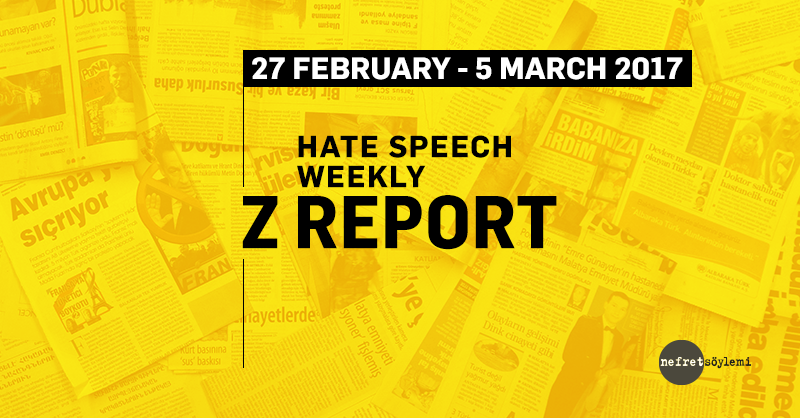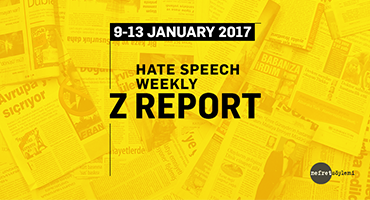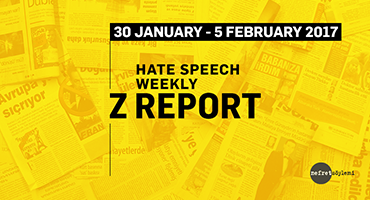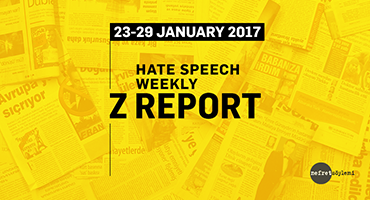Within February 27 - March 5, 2017, five news articles that generate hate speech had been selected for the weekly report. You can find these articles that generate hate speech against Armenians, Jews, Christians, Rums, Greeks and Syrians and the analyses below.1
1.
The article published in Adana Günaydın with the title of “That Syrian murderer caught on the way to Greece” and with the title of “He is in jail now” inside highlights the identity of the suspect in the title and text, though it is not directly related to the incident. The article associates Syrians with crime and leads to spreading of a negative perception of Syrians. Furthermore, an opposition between Syrians and Turks is created by writing, “Arrest warrant was issued for a Syrian murder suspect who allegedly killed a Turk in Adana.” |
2.
The article published in Milat Gazetesi with the title of “Christian terrorism is disregarded” and with the title of “Terrorism of CHRISTIANS is ignored” inside reports the speech by Ezher Sheikh Ahmed El Tayyip at a conference. The newspaper features Tayyip's statements without quotation marks and also distorts them. In this way, it associates Christians with terrorism and reinforces prejudices against them. |
3.
Akın Aydın, in his column titled “Wild and naughty child of the crusader”, writes: “Great Kurdistan dream in the south and east designed by crusader Christian and Jewish mentality, Greeks' Enosis dream in Cyrpus and Megali dream in Aegen and Marmara regions. And of course, there is the Great Israel dream of Jews and Kingdom of God dream of all Christians.” With these generalizations based on conspiracy theories through Jews, Christians and Greeks, he labels these identities as “threats”. He also labels Greeks in Turkey as “traitors”: “Greeks landed İzmir. And Greeks living there, whose lives, properties and honor had been protected by Turks up to that moment, started to attack Turks with Greek soldiers.” Furthermore, targeting Greeks throughout the column, Aydın provokes the readers against Greeks with a call of violence and incites enmity among people with these statements: “Hasan Tahsin raised his hand on this naughty, wild child (!), M. Kemal Atatürk took that hand and slapped the Greeks on the face on September 9. And those Greeks just started to recover. They crave for the slap of the Turks. I am sure of that, but I don't know whether we have a hero to do that!” |
4.
In Ortadoğu newspaper's article titled “UNFORGETTABLE PAIN”, there is a sub-heading like “Armenians brutally killed 613 people” and it is also stated, “On December 1991, Armenians, who occupied Karabakh capital Khankendi, targeted Khojaly next. Occupying all villages and roads around Khojaly, Armenians blocked the road to other cities." In this way, the newspaper accuses all Armenians because of a massacre. Thus, the enmity between people is incited by holding Armenian society responsible for what happened. |
5.
Muzaffer Kolik, in his column titled “We won't forget Khojaly Genocide”, writes: “Armenians killed our innocent cognates mercilessly and viciously. Bloody-minded and wild-eyed Armenian herd soaked Khojaly with Turkish blood with the support of Russians.” With these statements, the columnist demonizes Armenians by associating them with violence and massacre. Kolik also writes, “Mighty Turkish nation didn't and won't forget what Russians and Armenians did” and “As a nation, we will compensate this pain. And we won't wait for the afterlife, we will make Armenians pay for it.” With these remarks, he provoke people against Armenians and spreads a war discourse that incites enmity among people. |
1. Within the scope of the media scanning work focusing on hate speech, all national newspapers and around 500 local newspapers are scanned based on pre-determined keywords (e.g. Traitor, apostate, refugee, Christian, Jewish, separatist, etc.) by the media monitoring center. While the main focus has been hate speech on the basis of national, ethnic and religious identities; sexist and homophobic discourses are also examined as part of the monitoring work.




